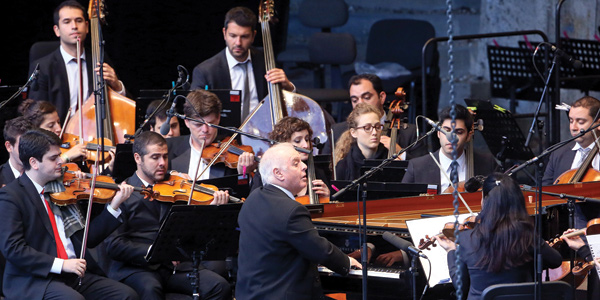States of mind: young Israelis and Palestinians share hopes and ideas but rarely meet
Members of the West-Eastern Divan Orchestra founded by Daniel Barenboim (centre) and the Palestinian academic Edward Said to promote dialogue between Middle Eastern cultures
“They can take away my house, they can take away my land, they can take away my freedom, but they cannot take away my education.” These are the words of a 22 -year-old student in Bethlehem. They sum up much of the reality of the situation in the Holy Land today.
I met him on my visit to Israel and Palestine, including Gaza, last week, travelling with a small group of bishops. We visited schools and young people as part of the preparation for the Synod of Bishops in October, which will focus on the concerns of the young.
We were briefed by the Latin Patriarchate of Jerusalem and by various diplomats. All seemed in agreement that the situation has never been worse and that we seem to be further away from the so-called “two-state solution” than ever before. The decision by the United States to recognise Jerusalem as the capital of Israel has only made things worse, as the Donald Trump administration has unilaterally taken a decision on what had been one of the major points for discussion within the peace process.
The first thing that struck me was the lack of knowledge that young people in both Palestine and Israel have about each other. It is comparatively rare that they have the opportunity to meet. That said, their ideals and hopes are very similar, and they would have much to talk about and discuss, like any other late teenagers and young adults. All of them had hope despite the situation in which they live. They really do think that life can get better, even though few of them can say how this would happen.
it also became clear to me that the thinking of Israeli teenagers from about 16 years old and upwards seems to be dominated by the military service which all of them, in principle, have to do. This is two years and four months for girls and two years and eight months for boys. One of the standing questions people ask each other is: “What did you do in the army?” The position one achieves in the military can be important for the job or prospects you will have in the future.
While I am aware of the system in Israel, I realised for the first time just how much their experience in the military dominates the thoughts of young Israelis. Palestinian youngsters and Arab Israelis do not do military service.
Finally, I could not help being keenly aware of how secularised many of these youngsters – Palestinian and Israeli – were. We often tend to think that they are in some way deeply religious. But, for example, the young people in one Israeli school about 45 minutes from Tel Aviv spent what free time they had in the city. Why? Because they could shop and eat; most of the restaurants in the town where they lived were kosher and they were looking for non-kosher. The attraction was so obvious to them that they did not even try to explain.
We travelled to Al-Qubeibah, an enclave created by the Israelis’ so-called security wall, and where Bethlehem University has founded a campus to educate nurses. I was deeply impressed by the way young women and men are willing to train to help their fellow citizens in various healthcare environments.
We had a memorable meeting with two young men in their early twenties from the Parents Circle Families Forum – one Palestinian, one Israeli – a group of over 600 families, roughly 300 Israeli and 300 Palestinian, who have lost a close relative in the fighting and terrorism, on both sides of the conflict. Both had lost teenage sisters. They told us painful stories and spoke of their efforts to create a climate of reconciliation.
They were a reminder to me that despite the horror, young people are willing to try and develop understanding and reconciliation. The forum will speak to anyone who will listen; in particular, its members go into schools to speak to the young people there.
I am depressed that things only seem to get worse in a part of the world I have been visiting, sometimes several times a year, since the mid 1990s. At the same time I am encouraged by the hope I always see in the hearts and lives of so many of the young people I meet. I am convinced that the policies being pursued by political leaders in this part of the Middle East are diametrically opposed to what should be happening. Everything possible should be done to create the opportunities for the young people we met in both Israel and Palestine to be able talk to each other, to get to know each other – to do things together.
At the moment, in the name of security, they are kept apart. The threat comes from extremists on both sides, but it also suits some politicians to maintain the status quo in order to retain power. Leaders are needed who are willing to take the risk of working against the grain in order to create a situation where human beings can meet, enjoy each other’s company and, in the true meaning of the word, love their sisters and brothers. The young man I quoted at the beginning is right; and education can be a major factor in improving the situation.
William Kenney CP is an auxiliary bishop in Birmingham. He travelled to Israel and Palestine with the Holy Land Coordination, a group of bishops from Europe, North America and South Africa which has been travelling to the Holy Land every year since the 1990s.


 Votes : 0
Votes : 0










